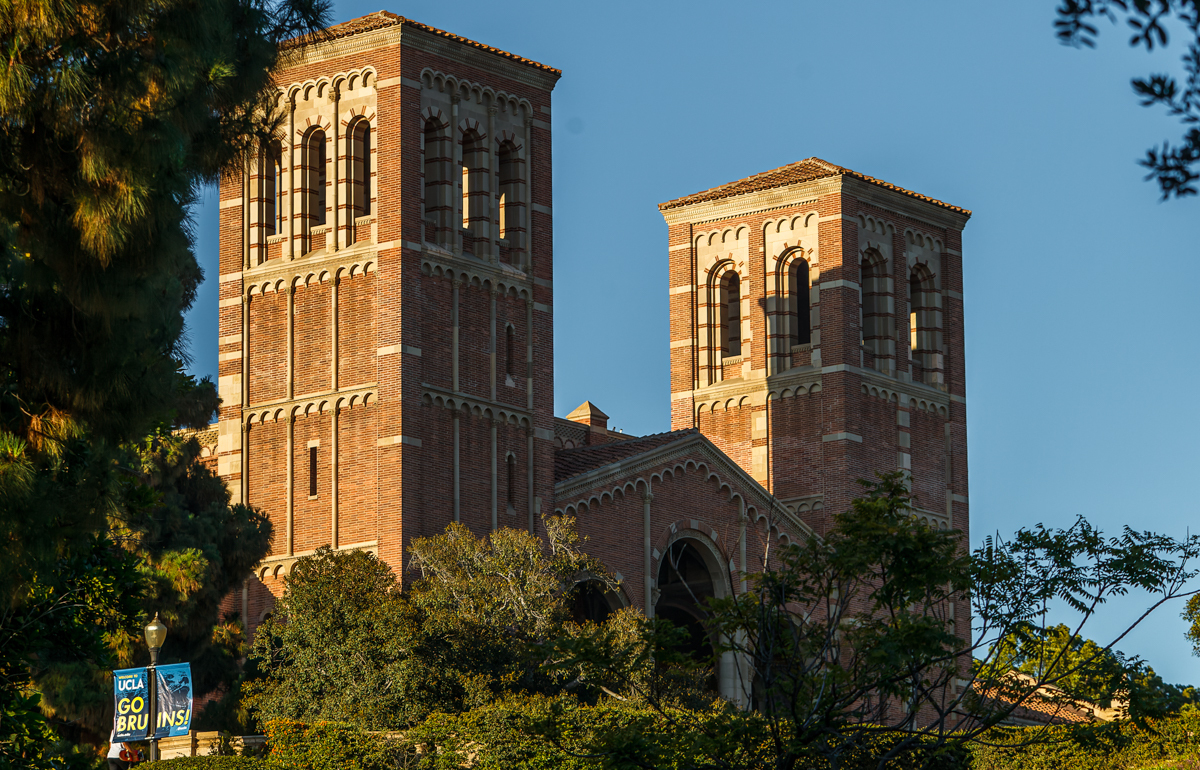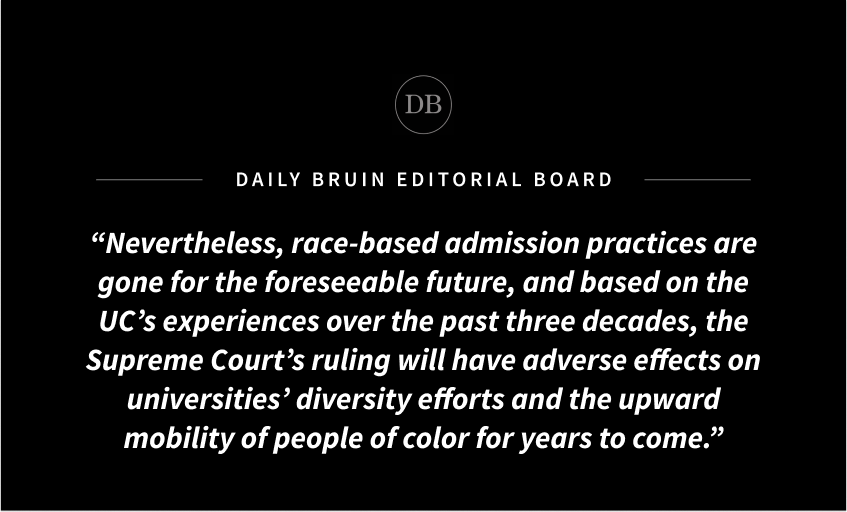UCLA community expresses dissatisfaction with the end of affirmative action

Royce Hall is pictured. The Supreme Court voted 6-3 to ban the consideration of race in college admissions. (Joseph Jimenez/Photo editor)
By Christopher Buchanan
July 7, 2023 7:02 p.m.
This post was updated July 9 at 9:35 p.m.
Students and faculty expressed disappointment regarding the United States Supreme Court’s decision to ban the consideration of race in university admissions.
The Supreme Court voted 6-3 to end affirmative action June 29. The case brought to the courts – Students for Fair Admissions Inc. v. President and Fellows of Harvard College – challenged the constitutionality of affirmative action throughout U.S. universities. The majority found that race-based admissions violated the Equal Protection Clause of the Fourteenth Amendment, impacting several categories of students, according to the decision. Justice Clarence Thomas proposed a “colorblind” admissions system, which solely focuses on the achievements of individual students, with no further considerations.
[Related: Supreme Court overturns affirmative action in 6-3 decision]
Justice Ketanji Brown Jackson, Justice Sonia Sotomayor and Justice Elena Kagan dissented.
Some students and professors believe this decision could curtail efforts to increase access to equitable educational opportunities.
Thrya Cobbs, the Undergraduate Students Association Council transfer representative and a fourth-year African American studies and history student, said she was saddened by the decision, adding that she believes this case could have enormous consequences on the educational future of Black and other minority students.
“For the Supreme Court to rule in favor of removing something that has been put in place to address those concerns around getting more Black Americans into higher education, it was kind of just a blow to all of us,” Cobbs said.
The decision said race-based admissions – while assisting certain minority groups – disproportionately burdened other racial groups who did not benefit from affirmative action, such as Asian Americans.
“It seems particularly incongruous to suggest that a past history of segregationist policies toward blacks should be remedied at the expense of Asian-American college applicants,” Thomas’ opinion said.
However, Christopher Nellum, executive director of Education Trust-West – an evidence-based educational advocacy organization – said many of the measurable factors of college admissions, such as extracurriculars and standardized testing, are inequitable and highly inaccessible, leading to less low-income Black and Latino admissions.
“Extracurricular activities, standardized prep, prepping for LSAT or ACT or going on vacations, those are things that are valued in the college admissions process,” Nellum said. “Folks who grew up in certain communities don’t have access to those things.”
California voters approved Proposition 209 in 1996, banning affirmative action in government and public programs, such as the UC system. This created a significant drop in admissions and yield of Black and Latino students on UC campuses, which have only recently recovered their previous numbers, said Mitchell Chang, a professor of education.
Cobbs, an Afrikan Student Union chairperson, also said she believes this decision could impact minority students’ desire to attend universities where less of their own community occupies the space. She added that this judicial action can promote social and educational segregation, furthering the divide between communities on campuses and impacting minority-driven programs.
Chang said this decision could also have impacts on education overall, adding that his research has shown attending a more racially diverse campus positively benefits students both academically and socially.
“Not just how they grow in areas of racial understanding, but also how these students are more likely to vote, to participate in their local communities, to serve in their local communities, to graduate on time and other positive outcomes,” Chang said.
If this ruling is interpreted more radically, it could lead universities to a decrease in resource efforts that assist minority students in their education, Nellum said.
Affirmative action has been such a prevalent political and social topic in recent years because of increasing competition between university applicants, Chang said.
UCLA’s applicant pool has become increasingly competitive since California’s affirmative action ban, as UCLA admitted about 70% of students in the 1980s, Chang added. This number has decreased exponentially over the last three decades, with an 11% admission rate of nearly 140,000 applicants in 2021.
Cobbs said she believes political polarization alongside long-standing social contexts – such as Black Lives Matter, Stop Asian Hate and the COVID-19 pandemic – have made issues like affirmative action more prominent and divisive among her peers.
“You’re seeing like three different things happening at once that kind of converged to shape issues like affirmative action,” Cobbs said.
Chang said he believes it is essential that universities continue to realize the importance of race in relation to opportunity so that admissions remain balanced for underserved communities.
Nellum said he hopes UCs and other universities continue to conduct community outreach to make connections with those who do not have access to proper educational resources. He added that he’s hopeful that efforts to diversify universities will continue, despite the Supreme Court decision.
“When we come together, we can win. So I don’t think this is the end of this debate,” he said. “This is not a done deal. It’ll go back to the court, something else will come that will help this along.”


